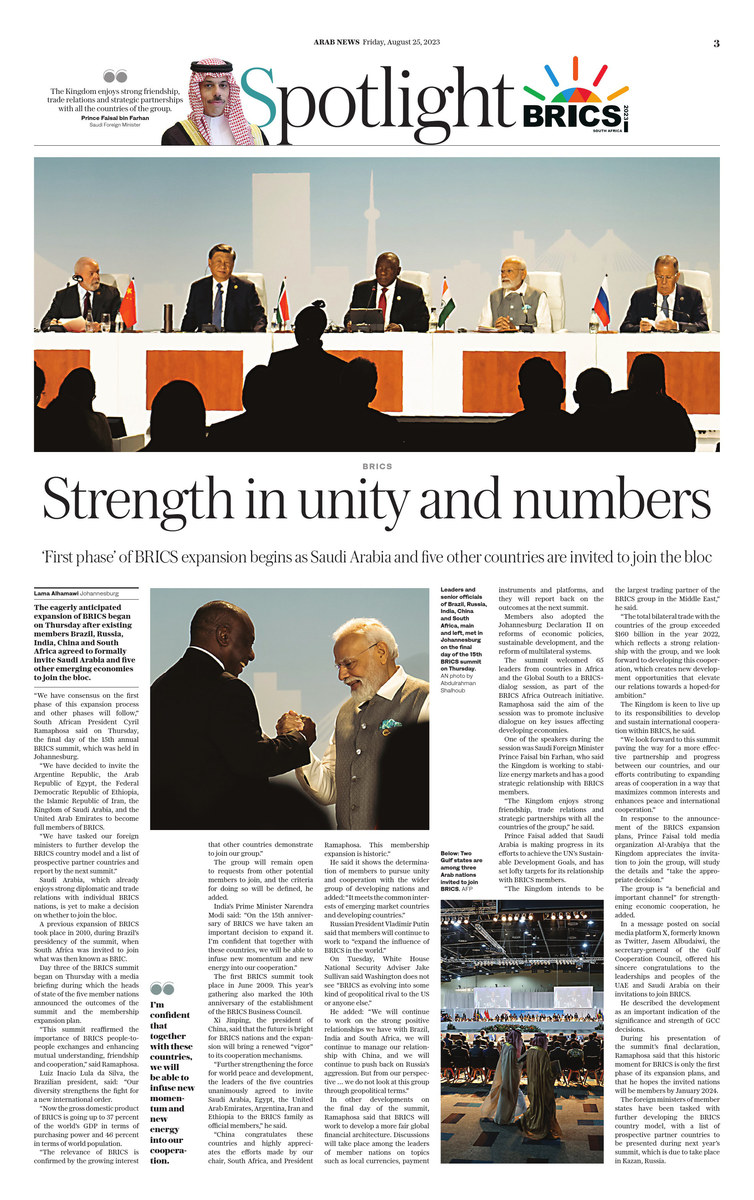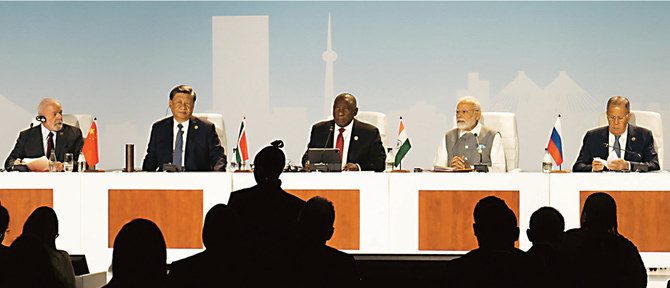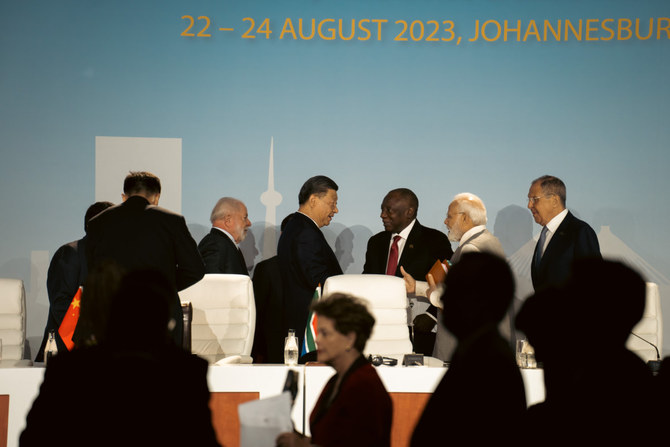JOHANNESBURG: The eagerly anticipated expansion of BRICS began on Thursday after existing members Brazil, Russia, India, China and South Africa agreed to formally invite Saudi Arabia and five other emerging economies to join the bloc.
“We have consensus on the first phase of this expansion process and other phases will follow,” South African President Cyril Ramaphosa said on Thursday, the final day of the 15th annual BRICS summit, which was held in Johannesburg.
“We have decided to invite the Argentine Republic, the Arab Republic of Egypt, the Federal Democratic Republic of Ethiopia, the Islamic Republic of Iran, the Kingdom of Saudi Arabia, and the United Arab Emirates to become full members of BRICS.
“We have tasked our foreign ministers to further develop the BRICS country model and a list of prospective partner countries and report by the next summit.”
Saudi Arabia, which already enjoys strong diplomatic and trade relations with individual BRICS nations, is yet to make a decision on whether to join the bloc.
A previous expansion of BRICS took place in 2010, during Brazil’s presidency of the summit, when South Africa was invited to join what was then known as BRIC.
Day three of the BRICS summit began on Thursday with a media briefing during which the heads of state of the five member nations announced the outcomes of the summit and the membership expansion plan.
“This summit reaffirmed the importance of BRICS people-to-people exchanges and enhancing mutual understanding, friendship and cooperation,” said Ramaphosa.
Luiz Inacio Lula da Silva, the Brazilian president, said: “Our diversity strengthens the fight for a new international order.
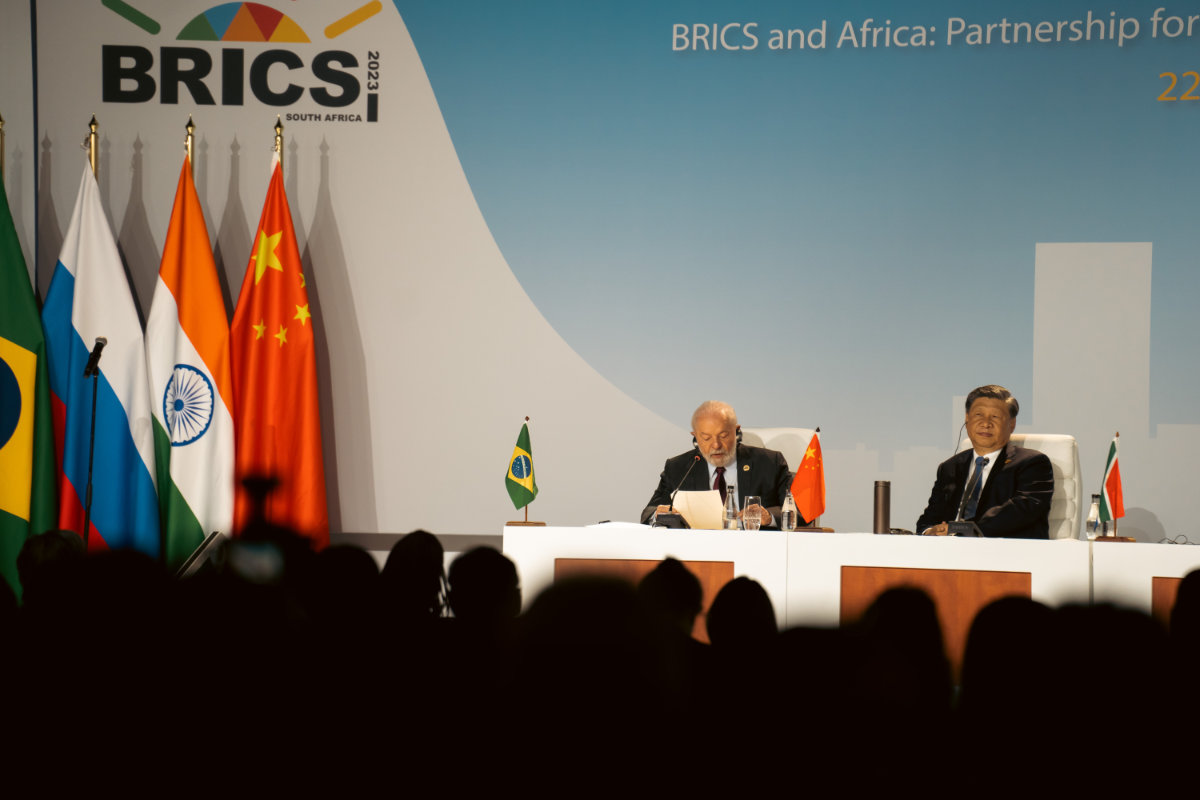
Brazil's President Luiz Inacio Lula da Silva speaks during the summit as China's Xi Jinping listens. (AN photo by Abdulrahman Shalhoub)
“Now the gross domestic product of BRICS is going up to 37 percent of the world’s GDP in terms of purchasing power and 46 percent in terms of world population.
“The relevance of BRICS is confirmed by the growing interest that other countries demonstrate to join our group.”
The group will remain open to requests from other potential members to join, and the criteria for doing so will be defined, he added.
India’s Prime Minister Narendra Modi said: “On the 15th anniversary of BRICS we have taken an important decision to expand it. I’m confident that together with these countries, we will be able to infuse new momentum and new energy into our cooperation.”
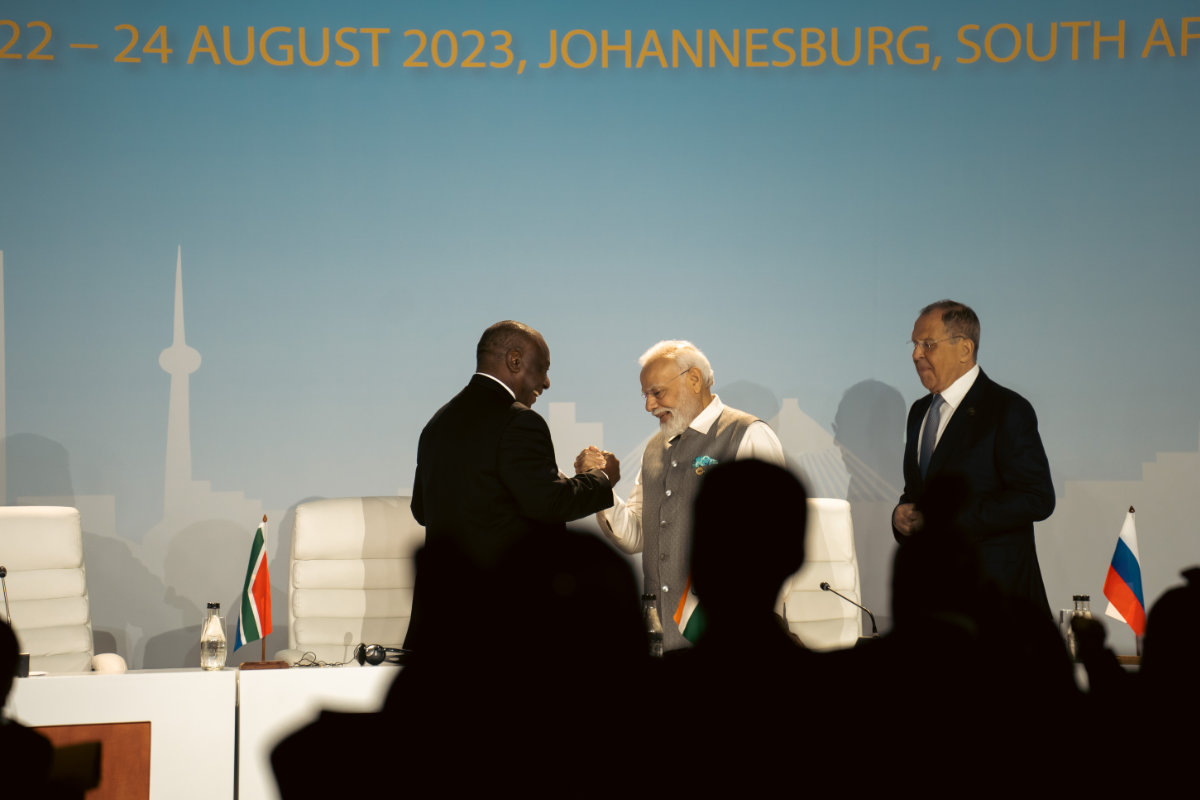
South Africa's President Cyril Ramaphosa welcomes India's Prime Minister Narendra Modi to the meeting on August 24 as Russian FM Sergei Lavrov looks on. (AN photo by Abdulrahman Shalhoub)
The first BRICS summit took place in June 2009. This year’s gathering also marked the 10th anniversary of the establishment of the BRICS Business Council.
Xi Jinping, the president of China, said that the future is bright for BRICS nations and the expansion will bring a renewed “vigor” to its cooperation mechanisms.
“Further strengthening the force for world peace and development, the leaders of the five countries unanimously agreed to invite Saudi Arabia, Egypt, the United Arab Emirates, Argentina, Iran and Ethiopia to the BRICS family as official members,” he said.
“China congratulates these countries and highly appreciates the efforts made by our chair, South Africa, and President Ramaphosa. This membership expansion is historic.”
He said it shows the determination of members to pursue unity and cooperation with the wider group of developing nations and added: “It meets the common interests of emerging market countries and developing countries.”
Russian President Vladimir Putin said that members will continue to work to “expand the influence of BRICS in the world.”
On Tuesday, White House National Security Adviser Jake Sullivan said Washington does not see “BRICS as evolving into some kind of geopolitical rival to the US or anyone else.”
He added: “We will continue to work on the strong positive relationships we have with Brazil, India and South Africa, we will continue to manage our relationship with China, and we will continue to push back on Russia’s aggression. But from our perspective … we do not look at this group through geopolitical terms.”
In other developments on the final day of the summit, Ramaphosa said that BRICS will work to develop a more fair global financial architecture. Discussions will take place among the leaders of member nations on topics such as local currencies, payment instruments and platforms, and they will report back on the outcomes at the next summit.
Members also adopted the Johannesburg Declaration II on reforms of economic policies, sustainable development, and the reform of multilateral systems.
The summit welcomed 65 leaders from countries in Africa and the Global South to a BRICS+ dialog session, as part of the BRICS Africa Outreach initiative. Ramaphosa said the aim of the session was to promote inclusive dialogue on key issues affecting developing economies.
One of the speakers during the session was Saudi Foreign Minister Prince Faisal bin Farhan, who said the Kingdom is working to stabilize energy markets and has a good strategic relationship with BRICS members.
“The Kingdom enjoys strong friendship, trade relations and strategic partnerships with all the countries of the group,” he said.
Prince Faisal added that Saudi Arabia is making progress in its efforts to achieve the UN’s Sustainable Development Goals, and has set lofty targets for its relationship with BRICS members.
“The Kingdom intends to be the largest trading partner of the BRICS group in the Middle East,” he said.
“The total bilateral trade with the countries of the group exceeded $160 billion in the year 2022, which reflects a strong relationship with the group, and we look forward to developing this cooperation, which creates new development opportunities that elevate our relations towards a hoped-for ambition.”
The Kingdom is keen to live up to its responsibilities to develop and sustain international cooperation within BRICS, he said.
“We look forward to this summit paving the way for a more effective partnership and progress between our countries, and our efforts contributing to expanding areas of cooperation in a way that maximizes common interests and enhances peace and international cooperation.”
In response to the announcement of the BRICS expansion plans, Prince Faisal told media organization Al-Arabiya that the Kingdom appreciates the invitation to join the group, will study the details and “take the appropriate decision.”
The group is “a beneficial and important channel” for strengthening economic cooperation, he added.
In a message posted on social media platform X, formerly known as Twitter, Jasem Albudaiwi, the secretary-general of the Gulf Cooperation Council, offered his sincere congratulations to the leaderships and peoples of the UAE and Saudi Arabia on their invitations to join BRICS.
He described the development as an important indication of the significance and strength of GCC decisions.
During his presentation of the summit’s final declaration, Ramaphosa said that this historic moment for BRICS is only the first phase of its expansion plans, and that he hopes the invited nations will be members by January 2024.
The foreign ministers of member states have been tasked with further developing the BRICS country model, with a list of prospective partner countries to be presented during next year’s summit, which is due to take place in Kazan, Russia.
